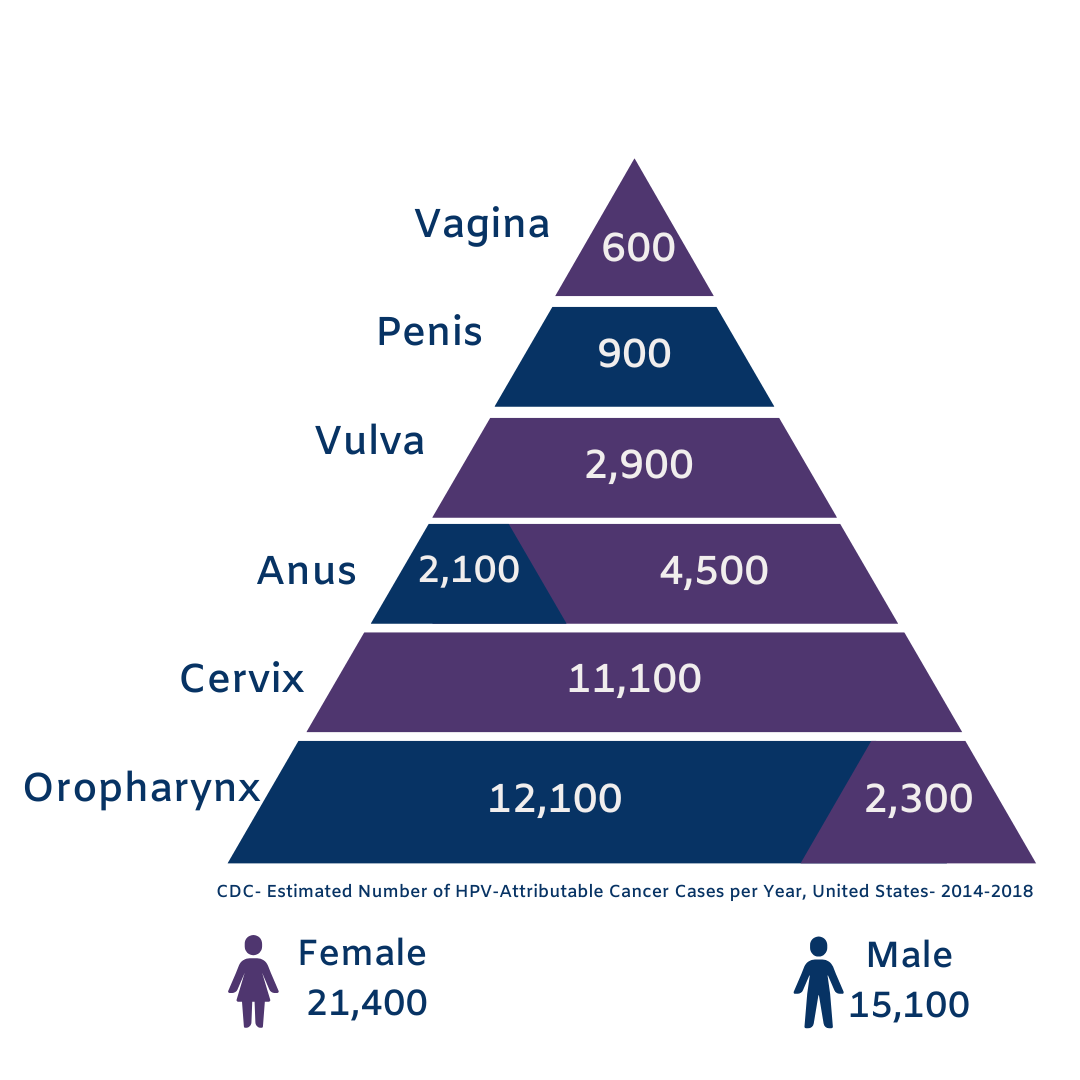What is HPV?
Human Papillomavirus
If you haven’t heard about the risks of certain HPV-related cancers and diseases yet, it’s time you did. HPV (Human Papillomavirus) is a virus that can infect both males and females and cause potentially serious consequences later in life.
HPV infections are common!
HPV infections are so common that nearly all men and women will get at least one type of HPV at some point in their lives. Nearly 80 million people living in the U.S. are currently infected with some type of HPV with 14 million new cases each year - half of those being teenagers and young adults.
Some HPV infections can lead to cancer…
Most HPV infections (9 out of 10) go away by themselves within two years. But, sometimes HPV infections will last longer, and can cause certain types of cancers.
HPV infections can cause six cancers:
cervical, vaginal, and vulvar in women
penile in men
anal and oropharynx (back of the throat including base of the tongue and tonsils) in both men and women
Every year in the United States, HPV causes about 39,000 cases of cancer in men and women.
How to Prevent HPV?
The HPV Vaccine!
The American Academy of Pediatrics (AAP) and the American Cancer Society (ACS) recommend all boys and girls start the HVP vaccine series between ages 9 and 12 to ensure children are protected long before they are ever exposed to the virus. CDC recommends starting the HPV vaccine at ages 11 or 12, however, HPV vaccination can be started as early as age 9. For the HPV vaccine to be most effective, the series should be given prior to exposure to the virus.
What is the HPV Vaccine?
The HPV vaccine is for boys and girls.
HPV vaccination is strongly recommended for boys and girls. HPV infections don't care if you are a boy or girl. The vaccine helps prevent infection with the most common types of HPV that can cause cervical, throat, vulvar, vaginal, penile, and anal cancer.
The HPV vaccine is recommended as early as age 9.
HPV vaccination is cancer prevention. The HPV vaccine produces the strongest immune response in preteens. By starting the vaccine series at age 9, you offer the most HPV cancer prevention for your child.
Children are vaccinated before they’re exposed to an infection – just like measles or pneumonia. HPV is so common that most people will catch it at some point in their lives.
HPV vaccination is cancer prevention.
HPV is short for human papillomavirus, a common virus. HPV can cause cancer in men and women. HPV vaccination helps prevent the infections that lead to genital warts and the spread of HPV cancers.
HPV vaccination is safe.
More than 300 million doses have been distributed around the world since 2006, and safety studies continue to show that HPV vaccination is very safe. The safety of vaccines, including the HPV vaccine, is continually watched by organizations in the US and around the world. All vaccines can have potential side effects, but reactions caused by the HPV vaccine have been mostly mild and like those of other vaccines.
The most common side effects include:
Pain, redness, or swelling in the arm where the shot was given
Dizziness or fainting (fainting after any vaccine, including the HPV vaccine, is more common among adolescents)
Nausea
Headache
For a complete list of side effects please visit Merck Vaccines
Two shots help prevent cancer.
The HPV vaccine is given as a series of two shots 6 to 12 months apart. The AAP recommends that girls and boys get vaccinated against HPV as early as age 9. The series should be complete by age 12, however, individuals aged 13-26 who have not been vaccinated or who have not completed the series should do so as soon as they are able.
A retrospective study showed that adolescents who started the HPV vaccine series at age 9 or 10 were 22 times more likely to complete the two-dose series by age 15 than those who initiated the series at age 11 or 12 (St. Sauver JL, et al. Prev Med. 2016;89:327-333).
- from the American Academy of Pediatrics
The HPV Vaccine and Fertility.
There is no evidence to suggest that the HPV vaccine causes fertility problems. Not getting HPV vaccine leaves people vulnerable to HPV cancers and precancers (abnormal cells that can lead to cancer).
- from CDC
Learn more at https://www.cdc.gov/hpv/vaccination-impact/?CDC_AAref_Val=https://www.cdc.gov/hpv/parents/vaccinesafety.html
99.9% of all cervical cancer is caused by HPV. Having to have treatment for cervical cancer can cause fertility issues.
- from the American Cancer Society.
Learn more at https://www.cancer.org/healthy/hpv-vaccine.html




